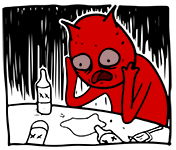I've worked on games in which it takes hours to walk from one side of town to the other. Many popular, award-winning RPGs boast of hundreds of generic towns and randomly generated quests. The shallow simulation of huge environments isn't a good thing. Providing dialogue for scads of NPCs means none of them has anything interesting to say. Creating an entire country means any single building will be devoid of useful objects. It's a matter of time and storage space, and no amount of whack-on-the-side-of-the-head thinking allows you to finesse your way around the problems. Limit the size of your world. Provide several smaller maps. Increase the density of interaction. This accomplishes several goals:
The point is that there are things to do/see during the walking, and that it both improves immersion and is enjoyable for it's own sake, rather than just being a walking grind. You engage with the world via signposts, maps, random encounters, scenic vistas, POIs etc...you find along the way. If you want a high density of interactions on a small map(s) only, just save us the trouble altogether and make a linear story campaign. There's nothing wrong with doing that, just commit to it. But, that's not an open world game and does not have the same appeal.
For what it's worth, I don't like randomly generated quests either, but what does that have to do with the open world vs hub world comparison? Morrowind does not have randomly generated quests, but Skyrim and Shadow of Mordor do, and so do lots of non-open world procgen rogue-likes, so it's not tied to being an open world or not.
- Players can explore without searching for something exciting to do. Aimless wandering is the enemy of fun.
What about aim-ful wandering where you use the terrain, instructions, signs, landmarks and so on to travel from one place to another, getting familiar with the world as you do so? This comment seems like something written by a person who just doesn't like open world games. Notably, Spector worked on NON fully open-world RPGs or Immersive Sims like Deus Ex and Thief. Again, nothing wrong with that, but what's the point in using his opinion on how to design an open world game?
- Developers can populate the world more densely with characters, objects, and quests, and give the illusion of a place with a life of its own/
Yeah, and you can do that inside a town or dungeon in an open world game, while still having a large map to explore. Does Morrowind not have areas with a density of characters, objects, and quests? There's no illusion of life when I loading-screen travel from place to place in a hub world, but if I walk from Sydan Neen to Balmora and come across rivers and bridges, wildlife and bandits, small towns and farms and mines and so on, there is the illusion of life.
- Action can be tailored to player skill. Difficulty can be increased easily as players get deeper into the game.
For love of god NO. Are you/Spector really advocating for level scaling? The worst thing about Oblivion, and the best thing to mod-out on any run, is the level scaling. How can I feel like the world is real and immersive when it exists to server me, the player, to such an extent that encounters and loot scale up with me? Holy immersion-breaking, batman. Also, player skill <<<< character traits in an RPG. Tying exploration to player skill rather than character ability makes for an action game, not an RPG.
- Developers can create more varied locations than in a sprawling world. This last point is critical, and most RPGs do this well. However, most RPGs feature wacky environments straight out of designers' fevered imaginations. It's not asking too much to think in terms of believable, recognizable locations instead of arbitrary game spaces. We should try to acknowledge the conventions of the everyday, even when we create fantasy worlds. In the real world, you can tell you're in a bedroom, as opposed to a bathroom, the instant you enter because of size, placement, and furnishings. More game designers should realize this.
I have no problem with this, but what does it have to do with open vs hub worlds? Skyrim had quite a good take on this, where Norhtern/Scandinavian style biomes are, and feel, real, while having a believable level of environmental variety across mashes, fjords, mountains, arctic ice flows, pine forests, rivers, tundra, etc...plus fantasy dungeons or the occasional trippy, colorful daedric world quest.
Deep as an ocean, wide as a puddle>Wide as an ocean, shallow as a puddle for me
Is The Outer Worlds as deep as an ocean? Where would you put Morrowind, for example, along that spectrum? What is the relationship of width/depth/puddle/ocean to the hub vs open world comparison? Morrowind is deep and TOW is shallow, so where does that leave us?



























